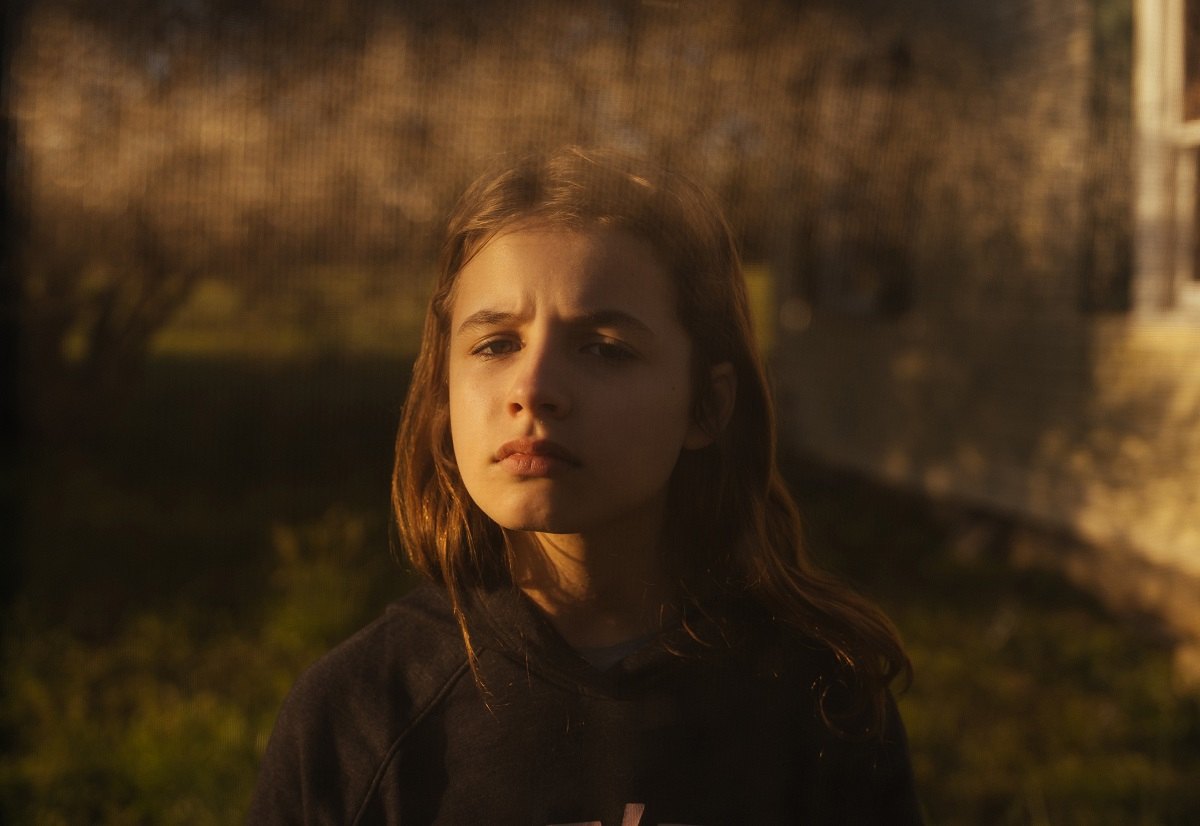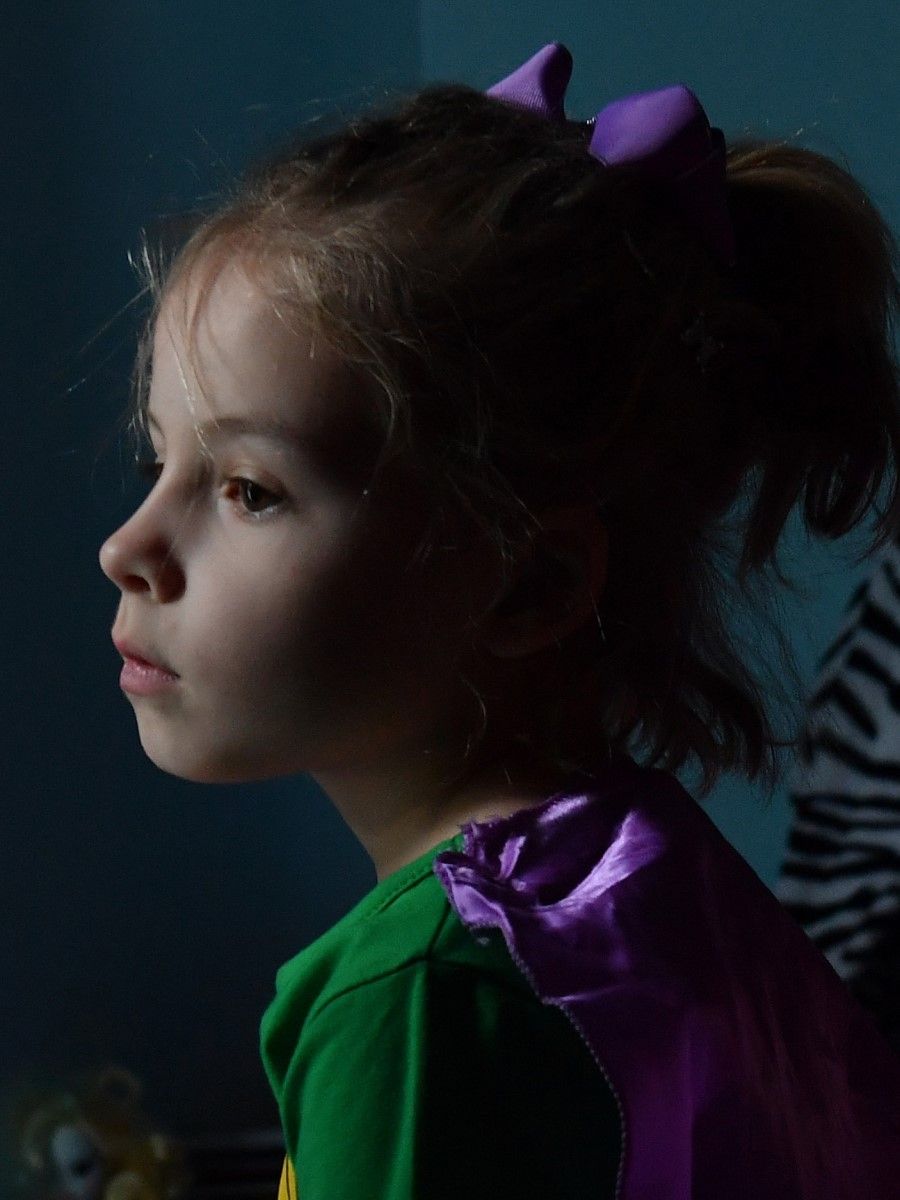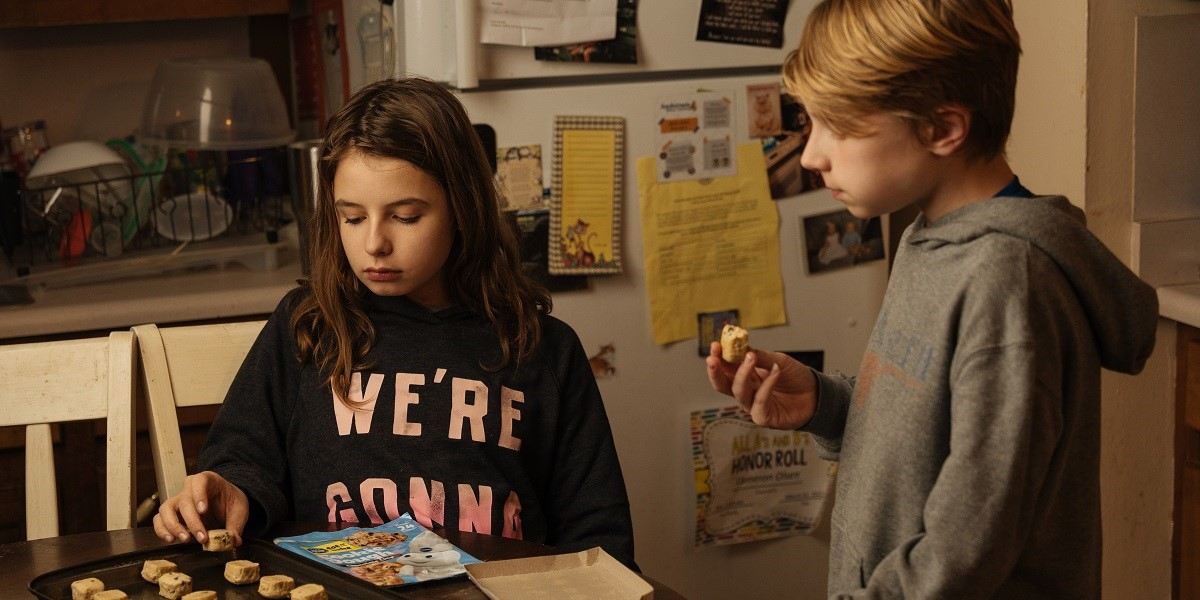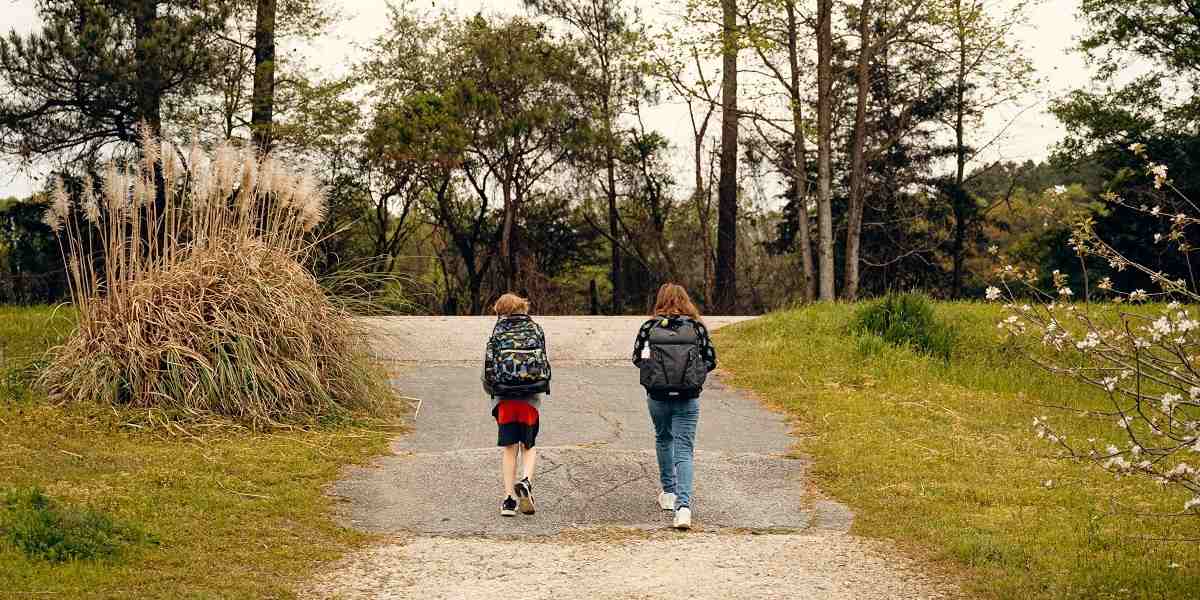
Ava Olsen, 13, poses for a portrait in her backyard in Townville, S.C. on March 29.
15:22 JST, May 2, 2023
TOWNVILLE, S.C. – Just before dawn, Ava Olsen lugged her new backpack into the living room and plopped it on the floor.
“This thing is so heavy,” said the 13-year-old, who had stuffed her bag with every item she suspected she might need for seventh grade, including 15 pens, a hairbrush, an oversized water bottle featuring the image of a bespectacled giraffe and a body spray labeled “Magic in the Air.”
Less than a month had passed since she’d done something no one ever thought she would do: go back to school. In 2016, when Ava was in first grade, she walked out onto the playground behind Townville Elementary as an angry 14-year-old pulled up in a truck, raised a handgun and opened fire. Ava escaped, but a classmate she loved, Jacob Hall, was shot in the leg. The only boy she’d ever kissed died three days later. He was 6.
She was so consumed by trauma and fear that her parents withdrew her from Townville. Ava transitioned to home schooling, not setting foot inside another classroom for six years.
Then, in February, her mom and dad finally decided to send their daughter back, and when they told her, she agreed to try. Ava didn’t have to return to her old campus, which only went up to sixth grade. Instead, she enrolled at Riverside Middle School, where many of the other Townville survivors also attended.
She’d done well in her first few weeks, making some friends and settling into her classes. But Ava’s early progress, her family understood, was fragile.
Whether she could stay for good, no one knew.
Now, on a morning in March, Ava laced up her unblemished, heart-pocked Skechers and brushed on the mascara she’d just started wearing.
As she waited for her brother, Cameron, to get dressed, Ava perched on the couch and stared at the custom background on her new iPhone. She’d designed it over the weekend, stitching together a purple collage of cats and butterflies, flowers and affirmations.
“Everything will be alright,” one of them read, because, for a long time, Ava didn’t believe that anything would be all right.
“Y’all about ready to head over?” her mother, Mary, asked Ava and Cameron, who is just 10 months younger than his sister. Soon, the kids were in the back seat, studying the day’s lunch menu on their phones.
“I’m just gonna get pizza,” Ava said. “They have that every day.”
Mary turned northeast onto Interstate 85, passing through the “Jacob L. Hall Memorial Interchange.” Ava used to loathe driving by the green sign bearing his name, but tried not to think about it anymore.
In the parking lot, she peered through the window at the black SUV stationed in front of the school’s entrance.
“I hope Officer Fort is back,” she said, referring to the regular resource officer, who’d been away part of the previous week. He made her feel safe. Ava got out of the car and, when she spotted him, they exchanged waves.
In the hallway, a curly haired girl whispered in her ear, and they both giggled. In homeroom, she showed a boy her iPhone.
“It’s my first phone!” she declared, so he showed off his, an old-school flip phone. “It’s a brick,” he deadpanned.
In math, as she tried to figure out 5 percent of 200, a student behind her dropped his calculator, and it smashed against the floor, an unexpected noise that once would have panicked her. She didn’t flinch.
Afterward, she headed down the hall and into another classroom, passing by a red “bleeding control” kit mounted to the wall, one of the safety features added in the wake of the Townville shooting.
“Ava – hey!” said a petite girl in a black Simpsons T-shirt.
Beaming, Ava waved at her.
“Your brother needs help,” the girl said.
“Yes,” Ava replied, rolling her eyes. “He does.”
Ava hadn’t entirely shaken her reticence, but in social studies, her favorite class, she took a crack at naming the nine Eurasian countries that would appear on an upcoming geography test and, in English, she lifted her hand to point out a grammatical error in a sentence.
When the lunch bell rang, Ava packed her bag and hurried down the hall to the cafeteria. She picked up a slice of cheese pizza and a cup of cubed pineapple, following two friends to a table outside where they sat in the sunlight.
“Apple juice is the best,” Ava announced, sipping from a carton.
“My dad loves orange juice,” said a girl with a ponytail, her tone disapproving.
A boy with a sweep of red hair across his forehead approached and pointed at Ava, who smiled and pointed back.
“Bye!” she said, which was, in fact, an invitation for him to stay.
“You’re, like, dating but literally hate each other,” said the friend with the ponytail.
The boy sat at the end of the table and unwrapped a chicken sandwich, listening while the girls’ conversation returned to their culinary preferences.
“I used to eat Play-Doh,” one of them said, and another mentioned that, as a little kid, she ate sand.
“I used to eat crayons, in kindergarten,” Ava replied, not mentioning that she ate them with Jacob, and that it was one of the few, fading memories she still had of him.
Ava threw out what remained of her lunch, and the three girls walked away. As they passed the playground, their phones tucked in their pockets, news began to spread about another elementary school shooting, this one in Nashville.
An angry 28-year-old had opened fire inside the school that morning.
Word of other school shootings had always devastated Ava, sometimes triggering meltdowns as her mind returned to what she used to call “the bad day.” She hated to think about more children dying and the thousands of others, like her, who had lost their friends and would never understand why.
Now, on a small private Christian campus 300 miles away, six people, including three 9-year-olds, had been shot to death. For the kids who survived, the questions and the crying and the nightmares were just beginning.
But Ava didn’t know any of that yet.
‘I hate my life’

Ava Olsen at age 7 on April 29, 2017.
She had just picked up a chocolate cupcake to carry out to recess when, on that balmy afternoon in September 2016, Ava and the other first-graders on Townville’s playground noticed a black Dodge pickup curl around the back corner of the school and rumble toward them.
Then they saw the gun.
The teenager holding it, who’d once gone to Townville, squeezed the trigger. Ava dropped her cupcake, sprinting toward the far side of the building.
After 12 seconds, the gun jammed. Ava’s teacher, Meghan Hollingsworth, was shot in the shoulder, and another child was struck in the foot. Only Jacob died.
At the funeral, he lay inside a small gray casket dressed in a Batman costume. Ava couldn’t bear to look at him.
She came apart after that, suffering through long stretches of quiet anguish that were often interrupted by bursts of rage. She hit herself and yanked out her eyelashes, once clawing her nails so sharply into her elbow that it caused an infection. She also began repeating what the shooter had screamed on the playground: “I hate my life.”
Nearly anything, Ava’s parents realized, could trigger her. She stopped watching “Frozen” because Elsa’s parents die in it, and she quit attending gymnastics practice because of the noise. Her father, David, was a police officer, but she couldn’t stand to see his service pistol, so he had to lock it in his cruiser each night. She snipped glittery green and red stickers into tiny pieces, then used them to cover up scary words in her copy of “Little House on the Prairie”: gun, fire, blood, kill.
Her world atrophied, limited almost entirely to her own home. For a while, she found purpose in writing letters to politicians. Ava sent her first plea in 2017, to President Donald Trump. She told him about Townville.
“I don’t want that to ever happen again,” she wrote. “Are you going to keep kids safe? How can you keep us safe?”
Four months later, the White House sent a letter back. The response, which included Trump’s huge, jagged signature, was kind and consoling, but Ava noticed that it offered no solutions, so she wrote him another letter, suggesting her own.
She sent more appeals to other elected officials and met South Carolina’s governor, Henry McMaster, at the State House, walking in with a black-and-pink notepad filled with recommendations and a stuffed Ninja Turtle named Mikey that had once belonged to Jacob.
“Somehow help people to understand what happens to kids like me who have seen and heard what happens when a gun hurts someone,” she’d written as idea No. 5.
“Keep guns away from kids or if they do have them make sure they stay locked up where someone can’t grab it who is not supposed to have it, especially kids,” read No. 7.
The people in charge didn’t listen, though, and the school shootings continued, in Parkland, Fla., and Oxford, Mich., and Uvalde, Tex. Ava heard about all of them.
She stopped writing letters to politicians and was prescribed pills to help her sleep. She talked to more than a dozen therapists, but almost none of them, she said, understood.
Though Cameron had also been on the playground at Townville, the terror of that scene never affected him in the same way. He stayed in school, earning honors in his classes and playing trombone in the band.
Ava longed to do those things, too, but not until 2021 did any of it seem remotely possible. Desperate to find their daughter an outlet, Mary and David signed her up for rec league soccer. She thrived, enjoying nothing more than stealing the ball from opposing players. She also felt welcomed by her teammates; when they sang “Happy Birthday” to Ava, Mary caught her smiling.
Last year, she met a new therapist who encouraged her to socialize more and, maybe, consider a return to school. A few months later, Mary, who’d started working nights as a secretary at a hospital, discovered that Ava wasn’t keeping up with her assignments. They decided they had to send her back.
Ava felt nervous, but not afraid, at least not in the way she used to.
And that was because of what happened on the last day in November, when Ava endured a second episode of gun violence that led her to believe she could overcome her trauma from the first one.

Ava and Cameron work on a batch of cookies at home.
‘Please don’t leave me’
Blood seeped into the grass.
Ava could see it from behind the wire fence that separated her family’s backyard from their neighbor’s horse pasture. A hundred feet away, writhing in the field, was Ava’s dog, Milo, a rescue that Mary and David had adopted for her a year earlier.
He’d been shot.
Ava had been reading a book in her bedroom when she heard the gunfire just outside the window. Now Mary was crawling under the fence, running toward Milo and insisting that her daughter stay back.
“He can’t get up,” Ava told her, both of them weeping.
A rifle round had struck his front left leg, nearly severing the limb. Their neighbor would later tell David that he mistook their dog for a coyote.
Mary asked Ava to find a towel, and she sprinted to the house to retrieve one. Ava brought it back to her mother and slowly approached the dog. She couldn’t stop screaming.
Just then, David arrived home from the grocery store, and Ava ran to tell him what had happened. He pulled his truck into the pasture and covered the bed with a tarp. He and the neighbor lifted the dog into the back, where Mary and Ava climbed in with him.
“You can’t freak out,” Mary told her daughter. “He really needs you.”
Ava, willing herself not to unravel, knelt beside Milo, petting his head as David sped to the emergency clinic.
“Please don’t leave me,” Ava told the dog. “Please don’t leave me.”
At the vet, a tech rushed Milo into the building while Mary found a sink for Ava to wash the blood off her hands. Her daughter had gone silent. Both of them expected the dog to die.
At last, the news came: The veterinarian would have to amputate his leg, but they predicted that Milo would survive.
Ava didn’t believe them. That evening, at home, she threw up. After a shower, she told her mom to discard her red-stained clothes.
Ava didn’t sleep much that night, but the next day, she learned that Milo had gotten a bit better, just as he did every day until the time came for him to return home.
She was thrilled, embracing her role as his nurse. She pinned a list of his medications to a bulletin board and cleaned up the messes he made in the house. At night, while he rested on the couch, she slept beside him.
For Ava, the experience was horrifying, but also transformative, because in the face of another shooting, she’d discovered something inside herself that she didn’t know existed: courage.
“I felt like,” she said later, “I wasn’t as weighed down anymore.”
‘Are you new?’
The pickup line in front of Riverside lurched forward on that recent spring day, and Mary stared ahead, toward the crowd of students gathered outside the entrance. She was worried.
“I’m not saying a word about what happened in Nashville,” she said. “I just have to be careful.”
Mary had realized that her own fits of anxiety exacerbated Ava’s, and she’d tried harder to regulate them, taking medication that helped her stay calm. Ava had felt an urge to return to school long before she actually did, a desire the teen mentioned to her father but never to her mother, convinced that Mary couldn’t bear to let her go.
Now that she had, Mary was determined not to jeopardize her daughter’s progress.
From the beginning, Ava’s return had gone better than she or her family expected. That was due in part to how Riverside prepared for all the kids who’d survived the shooting at Townville.
Last summer, just after Jennifer Roach took the job as principal, she met with Denise Fredericks, Townville’s longtime principal. Fredericks had shepherded her staff and students through the fraught years that followed the shooting, postponing retirement until the kids who had been on the playground with Jacob finished sixth grade and graduated.
Soon, nearly a dozen of those children would enroll at Riverside. Fredericks wanted Roach to know about every one of them, and though the Townville educator hadn’t seen Ava in years, she mentioned her, too.
Roach and her senior staff decided not to volunteer to their teachers which students were survivors, hoping to give them a chance to feel normal. It worked, and she took the same approach with Ava.
She was apprehensive on her first day, but when Ava stepped into the gym with hundreds of other students for the morning assembly, a girl she’d never met walked up to her.
“Are you new?” she asked.
That girl has since become her best friend, inviting Ava to her first sleepover since she was 6. They baked a Cinnamon Toast Crunch cake and stayed up past midnight, watching a marathon of “Scream” movies that Ava hoped wouldn’t give her bad dreams.
Ava eventually told her and two other friends about what she’d been through, and none of them made her feel ashamed.
“Just sympathetic,” she said.
Ava did well in most classes, struggling only in math, but she’d started staying late to catch up. To her teachers, she seemed shy but perceptive, and almost always happy.
“She smiles a lot,” said Tony Barbusca, Ava’s social studies teacher, who hadn’t noticed her ever struggling to acclimate. “She’s one of them, completely.”
Now, headed home in the car after pickup, Mary feared all of that was at risk.
Ava was quiet, and said she had a headache, but Mary suspected she hadn’t yet heard about the killings in Nashville. Her mother asked which electives she’d picked for eighth grade, and Ava told her that band was her top choice.
“What are you gonna play?” Cameron asked, sitting beside her in the back seat. “I don’t see you as a flute player.”
Ava shrugged.
“You can play flute, if you want,” Cameron continued, “but I see you as a saxophone.”
“I could do that,” Ava said.
At home, she tried to persuade Milo to join her outside, but when she finally eased him into the front yard, he hurried back to the door, hopping on his lone front leg.
He was too scared, Ava told her mom.
“Well, dogs can have PTSD, too,” Mary said.
Ava didn’t have any homework, so she sprawled on the couch playing “Minecraft” until Mary finished a pan of enchiladas. Afterward, Ava made chocolate chip cookies, sneaking a pinch of dough before she put them in the oven.
“I’m gonna go outside, to the horses,” Ava said.
She grabbed two apples off the counter and walked out the back door, down to the wire fence along the neighbor’s pasture. Even in her worst, most isolating moments, this expanse of green grass had served as a place of respite, and she’d refused to let Milo’s shooting take it away from her.
Ava spotted her second-favorite horse, which she’d named Dreamer, along the far tree line. Ava whistled, but it couldn’t hear her. She pulled up a horse-calling video on YouTube and turned the volume up, holding her phone out over the fence.
“Here, pretty girl,” she called, and Dreamer trotted over.
The horse munched on the apple in her palm as Ava ran her other hand along its mane.
“You’re so dusty,” she said.
With sunset nearing, Ava headed back inside.
It was dark when she finally saw a post about Nashville on TikTok. She felt nauseated. Ava asked her mom if what she’d seen was true, and Mary said that it was.
She went to her bedroom and laid among her plush toys, including Mikey, Jacob’s stuffed Ninja Turtle. She couldn’t sleep, her mind once more on the bad day.
On the other side of the house, Mary braced for a meltdown. Would all of her daughter’s progress at Riverside be undone? Would Ava tell her that she couldn’t go there anymore?
She waited, but it never happened.
The next morning, Ava got out of bed before dawn and packed her bag, then she laced up her Skechers, brushed on her mascara and went back to school.

Ava and Cameron walk along the driveway at the start of their school day in late March.
Top Articles in News Services
-

Survey Shows False Election Info Perceived as True
-

Hong Kong Ex-Publisher Jimmy Lai’s Sentence Raises International Outcry as China Defends It
-

Japan’s Nikkei Stock Average Touches 58,000 as Yen, Jgbs Rally on Election Fallout (UPDATE 1)
-

Japan’s Nikkei Stock Average Falls as US-Iran Tensions Unsettle Investors (UPDATE 1)
-

Trump Names Former Federal Reserve Governor Warsh as the Next Fed Chair, Replacing Powell
JN ACCESS RANKING
-

Producer Behind Pop Group XG Arrested for Cocaine Possession
-

Japan PM Takaichi’s Cabinet Resigns en Masse
-

Japan Institute to Use Domestic Commercial Optical Lattice Clock to Set Japan Standard Time
-

Man Infected with Measles Reportedly Dined at Restaurant in Tokyo Station
-

Israeli Ambassador to Japan Speaks about Japan’s Role in the Reconstruction of Gaza






















